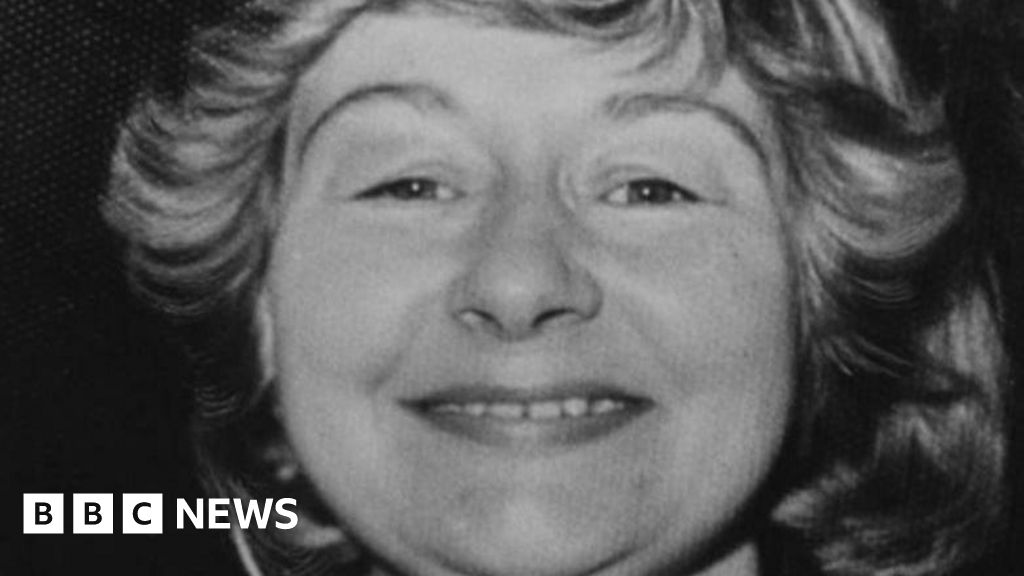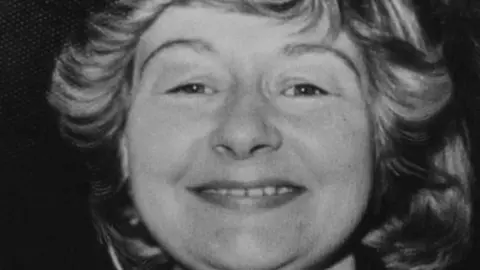 Bedfordshire Police
Bedfordshire PoliceFor more than four decades, Allen Morgan thought he had got away with a murderous plot. But he had not banked on cold case detectives knocking on the door of a witness, back then a teenager, who told officers she had “been waiting for you to come see me for 40 years”. How was the conspiracy behind the killing of a shopkeeper uncovered and will the actual attacker ever be caught?
In 1979, Allen Morgan ran a convenience store on a council estate in Linslade, Bedfordshire, with his wife, Carol.
Less than two years later, on 13 August 1981, Morgan rang police – confused and jumbled – after finding Carol dead in the store.
Morgan returned home after being at the Odeon cinema in Luton with his step-children at the time of the killing – during which £435 in cash and some cigarettes were stolen.
But that did not stop the rumours.
“The original investigation was aware very quickly that Allen Morgan was suspected of having an affair,” says Det Supt Carl Foster.
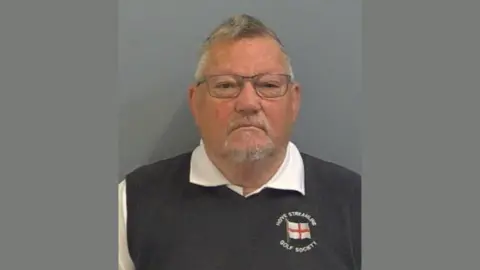 Bedfordshire Police
Bedfordshire PoliceOfficers spoke with Morgan and the woman he was having an affair with, who was then called Margaret Spooner.
“It would be fair to say that the original investigation team had their concerns and suspicions about Allen and Margaret,” says Det Supt Foster.
“But, of course, Allen Morgan had a concrete alibi.”
He said the focus then was instead on trying to identify a man seen running away from the shop, noted for his distinctive “piggy” nostrils.
Even so the gossip persisted, leading Morgan to do a series of interviews with the media in a bid to clear his name – in one saying “I didn’t do it” and “How can I clear my name until the real murderer is caught?”.
One journalist he spoke to was the BBC Look East reporter John Kiddey, who remembers the interview.
“He was one of those people who quite liked, I think, being filmed… the celebrity of it, which was very strange,” says Mr Kiddey.
“His whole demeanour, to me, was weird. He didn’t react in any way as you’d expect a man whose wife had just been brutally murdered to react.”
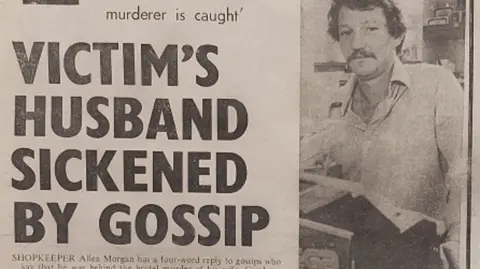 Bedfordshire Police
Bedfordshire PoliceMorgan admitted in the interview about being “a bit of a womaniser”, a comment Mr Kiddey – who found him “arrogant” – says was “shocking… he didn’t need to share that with the public”.
But there was one thing that really stood out for Mr Kiddey.
“When I asked him ‘how do you feel your wife has been murdered?’, I imagined him to burst into tears.
“He didn’t… he amazingly said ‘I’ve lost business, I’ve lost money’ rather than I’m devastated my wife is dead. I just couldn’t believe what he was saying to me.”
Mr Kiddey says he kept going with the interview as he wanted Morgan to say “something human, and he didn’t”.
“It was a weird, strange reaction which made me think ‘perhaps he did do it’.”
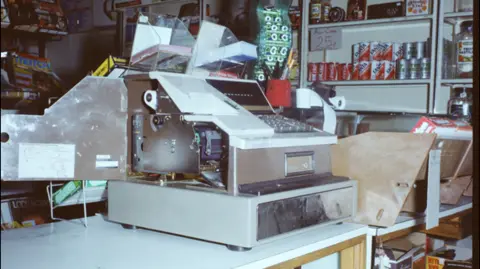 Bedfordshire Police
Bedfordshire PoliceMore than 80 officers were assigned to the murder investigation, chasing down leads out of a hot and cramped incident room in Leighton Buzzard, Bedfordshire.
One of those lines of inquiry was a dark green estate car seen parked near the shop at the time of the killing.
A month on from Carol’s murder, without any arrests, police even went as far as hiring the services of a forensic hypnotist in a bid to try to get more information out of witnesses.
A local businessman put up a £5,000 reward for information, while detectives made use of Luton Town Football Club’s new computerised scoreboard to appeal to 12,000 Second Division football fans.
It was to no avail. The murderer was never caught and people seemed to move on, despite police reviews of the case every two years.
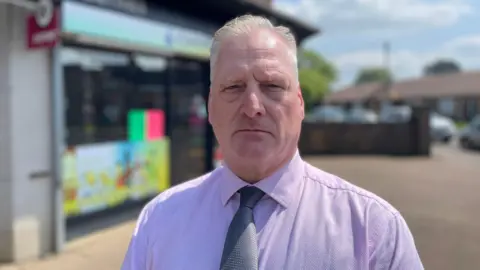 Laura Foster/BBC
Laura Foster/BBCThat was until 2018, when Det Supt Foster took over as the head of the Bedfordshire, Cambridgeshire and Hertfordshire cold case review team.
One of his first jobs was reading through the review of the case.
“The first question I asked the officer who wrote the review was ‘what did Allen Morgan say when he was arrested?’ and it was at that point I discovered he’d never been arrested,” he said.
He saw enough to make the decision to revisit all witnesses.
“There was one witness in particular that when we knocked on their door her first response was, ‘I’ve been waiting for you to come see me for 40 years’,” he said.
Her name was Jane Bunting, who was then aged 17, and for whom Margaret acted as a mentor.
Ms Bunting would later go on to tell a criminal trial that while at the former Dolphin pub in Leighton Buzzard, Morgan asked her whether an ex-boyfriend would know anyone who could kill Carol.
Ms Bunting said she did not mention this at a police interview at the time as “Margaret asked me not to… I owed her and I was loyal to her”.
By the time of this fresh investigation, the couple had married and settled down in Brighton.
Police – who had about 6,000 documents to trawl through – arrested the pair three times and used the opportunity to secretly record conversations.
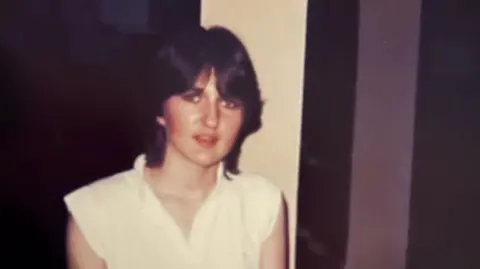 Bedfordshire Police
Bedfordshire PoliceIn 2019 Margaret was heard to say “Shush”, indicating she thought they were being taped. He said: “I am sorry” and “I don’t want to say anything because they might have…”
In a letter Allen wrote to Margaret that same year, after they had been arrested, he said: “Trust works on both side. If I didn’t trust you, you wouldn’t be here and I would not.”
Det Supt Foster, who came out of retirement to finish the case, said: “I don’t think you need to be a police officer to listen to those recordings and think if you’re innocent and haven’t done anything why are you shushing each other and making comments like ‘they might be recording us’?… if you’ve got nothing to hide speak freely and openly.”
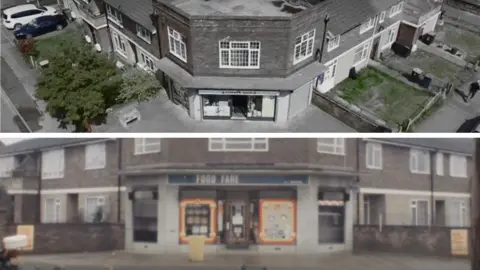
The couple were charged last year, and underwent a two-month trial at Luton Crown Court.
Morgan, now 74, was found guilty of conspiring to murder and received a life sentence with a minimum time of 21 years and 325 days to be served.
“The brutality of the killing shocked all those who attended the scene,” the judge said while outlining how he found Morgan to be “wicked”.
Margaret Morgan was found not guilty of the same charge. She made no comment to BBC questions about her husband’s conviction as she left court.
The killer, who has never been caught, used an axe or machete to attack Carol.
Det Supt Foster added: “In the absence of a confession, we may never know who carried out the physical act of murdering Carol.
“However, we will do all in our power to secure new evidence and bring them to justice.”
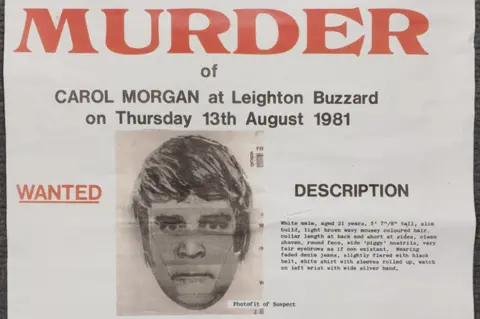 Bedfordshire Police
Bedfordshire Police